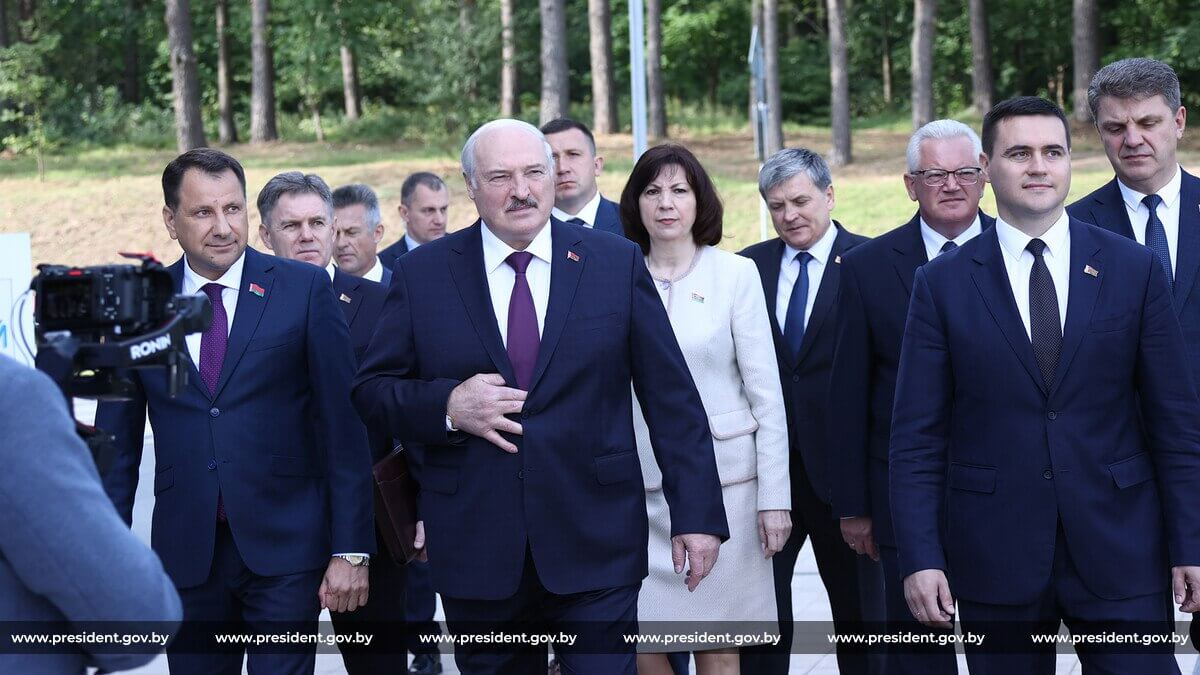
Thirty years after the collapse of the Soviet Union, Belarus is still ruled by people whose mentality was shaped in the USSR or who were considerably influenced by the Soviet past. As succession draws closer, Alaksandar Łukašenka may have to choose between the Soviet and post-Soviet generation.
Natalla Kačanava, a senior official considered by observers as his potential successor, met with journalism students in Minsk in early December 2020.
It was not a big surprise that she echoed the Belarusian strongman’s claim that the 2020 anti-government protests had been masterminded by the West.
She put her backwardness on display when she recalled her trip to Yugoslavia in 1989 and an alleged secret plan by Allen Dulles, the CIA director in 1953-61, to destroy the Soviet Union by secretly corrupting moral values.
Pornography and Dulles’ Plan
Kačanava said she was shocked by Yugoslavians’ corrupt morals when she visited Belgrade during her work as a Soviet water supply company engineer.
“I traveled abroad for the first time,” she said. “That was a wonderful country, Yugoslavia, absolutely wonderful. Plenty of goods at the stores, beautiful country, people, everything was good. But at the same time they were screening pornographic films, and the spirituality and public morals were already being corrupted. A few years later, the country was bombed to dust,” she said in an apparent reference to the 1999 bombing by NATO.
Pornography was available in the Socialist Federal Republic of Yugoslavia, and was completely prohibited in the conservative Soviet Union. But the latter would collapse anyway.
Yugoslavia was considered a liberal country by Soviet standards. It produced pornographic films and an erotic magazine called Chik in the 1970s.
As for the Dullas Plan, it was a conspiracy theory that originated after the collapse of the Soviet Union among radical critics of the West.
Although opponents ridicule Kačanava’s clumsy anti-Western indoctrination techniques, many seriously consider her a potential successor to Łukašenka.
Kačanava’s worldview is a characteristic of Belarusian hardliners. Ivan Tertel, chair of the Committee for State Security (KGB), and Viktar Chrenin, are notorious for their statements and behavior illustrative of Soviet mentality.
Rituals, myths and double standards
Belarus has had a reputation as the most Soviet of the USSR republics and as a Soviet preserve managed by a former collective farm boss.
Łukašenka won the 1994 presidential election taking advantage of the Belarusians’ nostalgia for the Soviet Union. The Belarusian ruler will turn 70 in 2024.
He has appointed people born between the mid-1950s and early 1970s to key positions in the government, his presidential administration and security agencies.
Alexei Yurchak, an American-Russian anthropologist, described people of the type as the last Soviet generation. The Soviet Union’s collapse was a psychological trauma for many of them.
Yurchak noted that the last Soviet generation actually did not take Soviet values seriously and defied Soviet morals. Double moral standards were common place in the former Soviet Union, while conformism was a key to success.
Belarusian officials share the traits of the last Soviet generation described by Yurchak, such as double moral standards, conformism, obedience and loyalty to their leader.
Soviet background helped Kačanava, Chrenin, Tertel and others make successful careers under the neo-Soviet regime.
Ruler’s outdated views define his HR policy
The last Soviet generation lost key government positions in the Baltics, Georgia and Ukraine to people born in capital and large cities (often women) in the late 1970s and 1980s, educated in the West and fluent in foreign languages.
Łukašenka distrusts professionals holding degrees from Western education establishments with connections in the West. Notorious for his skepticism about women’s empowerment, he has appointed very few women to key positions.
In general, the Belarusian ruler continues to rely on the last Soviet generation, giving preference to security and military officers, people from villages and small towns educated in Belarus or Russia.
However, the first post-Soviet generation or the Łukašenka-era generation, has also infiltrated the top brass. Representatives of this generation include Maksim Jermałovič, 45, a deputy head of Łukašenka’s administration; Dźmitryj Kruty, 41, the Belarusian ambassador in Russia; and the Belarusian ruler’s son Viktar Łukašenka, 47.
If age was the key criterion, Prime Minister Raman Hałoŭčanka, 49, who holds a degree from the prestigious Moscow State Institute of International Relations, could also be included in the group.
Dilemma
Łukašenka has not yet announced any plans to retire. Anyway, he will eventually have to pick himself a successor, and possibly to choose between a representative of the last Soviet generation or a younger figure educated during his rule.
The Belarusian ruler puts his trust in the last Soviet generation and distrusts young and ambitious people. He is wary of radical change and experiments. He is very suspicious of the generation that was the driving force of the 2020 anti-government protests.